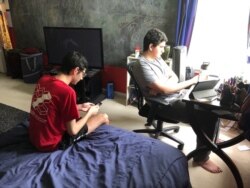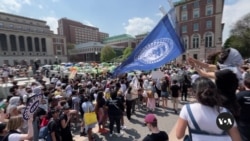Student Union
- By Dora Mekouar
COVID-19 Diaries: We're Supposed to Be Empty-Nesting
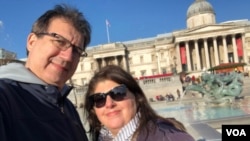
We’re supposed to be empty nesting.
After our youngest went off to college last fall, my husband and I settled into a low-key routine that, for the first time in 21 years, centered solely around us. Our daily life became a bit more relaxed now that it wasn’t driven by our children’s schedules, high school activities, or the daily inquiry whether the boys would be home for dinner and then trying to come up with a meal they'd eat.
Initially, my husband and I worried about suffering from empty nest syndrome, which the Mayo Clinic describes as “a phenomenon in which parents experience feelings of sadness and loss when the last child leaves home.” And we did feel a little melancholy after dropping our baby boy at school.
But there was also a deep sense of relief and accomplishment that we were closer to achieving one of our major life goals — raising two well-adjusted, responsible and loving young men who were well on their paths to adulthood. Ultimately, that’s every parent’s job. From the first time we drop our children at preschool or put them on the school bus, we begin the process of teaching them to eventually leave us, to become independent adults in the world.
Now, all my husband and I had to focus on, day-to-day, was one another and our jobs. I anticipated traveling more for work now that I didn’t feel the need to be physically present for my children.
We even celebrated our new phase in life by booking an “empty-nest-moon" to London and Paris. We got a great deal. For the first time in years, we were able to take a dream vacation in the off-season at unbelievably low rates. Here was a very bright side of empty-nesting. We immediately started talking about planning another getaway in the spring.
But then COVID-19 happened. The boys came home for spring break and never went back to school. My youngest felt cheated out of his freshman year and the joys of dorm life. My eldest, a junior accounting major, was supposed to spend the summer visiting potential employers across the country — from Boston to Florida and Texas. Now those externships are happening online.
And my husband and I are cooking a lot, again. Where we’d been picking up a roast chicken or making omelets when we didn’t feel like making dinner, now we’re cooking more than ever since no one is going out to eat.
However, the isolation brought on by the pandemic has also given me a gift — time with my almost-adult sons that I would have never had otherwise.
In all likelihood, my 21-year-old won’t live at home fulltime again, since he’s already received some excellent job offers. But now, most mornings, he comes by my home office with a cup of coffee in hand. He settles into a comfortable stuffed chair and we chat over morning coffee. My younger son might stop by my room while I’m watching TV or reading before bed. He’ll stretch out across the bed and talk for a while.
I also have more insight into their college life —what their classes are like and how much stress can surround their exams.
We all eat together as a family every night — something that hasn’t happened in years due to their school activity schedules and part-time restaurant jobs. My boys are two-and-a-half years apart and have vastly different personalities and interests. They didn’t fight much growing up, but they also weren't particularly close during their teen years. Now they spend more time talking and relating to each other.
I normally spend most of Mother’s Day with my own mother because the boys are usually working. I would see them for part of the day, after they had worked the Mother’s Day rush at the restaurants. This Mother’s Day, both will be home all day. The youngest will make dinner and they’ll both play Scrabble with me, although they hate the game and refuse to play with me any other time of the year. We will laugh and spend this unexpected time together that we would not have had if we weren’t isolating at home.
On all fronts, our family bond is deepening and strengthening.
I have all the joys of having my children at home and none of the burdens. They don’t require constant attention and they mostly look after themselves. I don’t have to worry about homeschooling them; the boys retreat to their rooms for long periods of time to work on their college courses. It’s all good. Very good.
Isolation isn’t fun. But it’s given me the sweetest, most unexpected of gifts, more time with my children before they go out into the world to become whoever and whatever they were meant to be.
See all News Updates of the Day
- By Tina Trinh
US college students face muted graduations amid Gaza war protests
Commencement ceremonies are being scaled back or canceled at U.S. universities because of security concerns over pro-Palestinian student protests. While some campus demonstrations have resulted in concessions, others have led to violent confrontations. VOA’s Tina Trinh has the story from New York.
- By VOA News
Police arrest 33 at George Washington University protest encampment
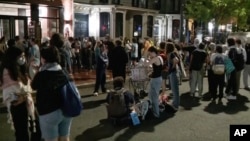
Police in Washington cleared out a pro-Palestinian encampment protest at George Washington University early Wednesday, arresting 33 people, authorities said.
Arrests were made for assault on a police officer and unlawful entry, the District of Columbia's Metropolitan Police Department said.
Police started to shut down the tent encampment after dozens of protesters marched to GWU President Ellen Granberg's home Tuesday night. Demonstrators carried signs that read "Free Palestine" and "Hands off Rafah." Police were called, but no arrests were made then.
Rafah, Gaza’s southernmost city, is where much of the territory’s population has clustered. The area is also a corridor for bringing humanitarian aid into the Palestinian territory.
Israel seized the Gaza side of the Rafah crossing on Tuesday, while shutting off the nearby Kerem Shalom crossing, drawing criticism from humanitarian groups. Israel said Wednesday it had reopened Kerem Shalom.
GWU officials warned students that they could be suspended for engaging in protests at the school’s University Yard, an outdoor spot on the campus.
"While the university is committed to protecting students' rights to free expression, the encampment had evolved into an unlawful activity, with participants in direct violation of multiple university policies and city regulations," a GWU statement said.
Event organizers said police used pepper spray to contain the crowd of protesters on Wednesday.
Police said they dispersed demonstrators because "there has been a gradual escalation in the volatility of the protest."
A congressional committee canceled a hearing on the university encampment Wednesday. District of Columbia Mayor Muriel Bowser and Metropolitan Police Chief Pamela Smith had been scheduled to testify about the city’s handling of the protest before the House Committee on Oversight and Accountability.
More than 2,600 people have been arrested on 50 campuses in pro-Palestinian demonstrations, according to The Associated Press.
The nationwide campus protests started in response to Israel's offensive in Gaza that began after Hamas launched an attack on Israel on October 7, killing some 1,200 people and taking roughly 250 hostages.
More than 34,000 Palestinians have been killed in Israel's offensive, according to the Health Ministry in Hamas-run Gaza. Israel warned it could "deepen" its operation in Rafah if cease-fire talks fail to secure the release of the hostages.
Some information for this report was provided by The Associated Press.
- By VOA News
What to ask on a college visit
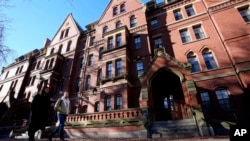
Sarah Wood lists 32 questions for applicants to learn more during a campus visit. (April 2024)
- By VOA News
US is now the most desirable country for international students

That’s according to this year’s Emerging Futures research survey, from education consultant IDP Connect. Other Western countries have slipped due to new visa restrictions and caps on international students. Read a summary of the research from ICEF Monitor. (April 30, 2024)
Pro-Palestinian protesters break through barricades to retake MIT encampment

Pro-Palestinian protesters who had been blocked by police from accessing an encampment at the Massachusetts Institute of Technology on Monday broke through fencing, linked arms and encircled tents that remained there, as Columbia University canceled its university-wide commencement ceremony following weeks of pro-Palestinian protests.
Sam Ihns, a graduate student at MIT studying mechanical engineering and a member of MIT Jews for a Ceasefire, said the group has been at the encampment for the past two weeks and that they were calling for an end to the killing of thousands of people in Gaza.
"Specifically, our encampment is protesting MIT's direct research ties to the Israeli Ministry of Defense," he said.
Protesters also sat in the middle of Massachusetts Avenue, blocking the street during rush hour in the Boston area.
The demonstrations at Columbia have roiled its campus and officials said Monday that while it won't hold it's main ceremony, students will be able to celebrate at a series of smaller, school-based ceremonies this week and next.
The decision comes as universities around the country wrangle with how to handle commencements for students whose high school graduations were derailed by COVID-19 in 2020. Another campus shaken by protests, Emory University, announced Monday that it would move its commencement from its Atlanta campus to a suburban arena. Others, including the University of Michigan, Indiana University and Northeastern, have pulled off ceremonies with few disruptions.
Columbia's decision to cancel its main ceremonies scheduled for May 15 saves its president, Minouche Shafik, from having to deliver a commencement address in the same part of campus where police dismantled a protest encampment last week. The Ivy League school in upper Manhattan said it made the decision after discussions with students.
"Our students emphasized that these smaller-scale, school-based celebrations are most meaningful to them and their families," officials said.
Most of the ceremonies that had been scheduled for the south lawn of the main campus, where encampments were taken down last week, will take place about 8 kilometers (5 miles) north at Columbia's sports complex, officials said.
Speakers at some of Columbia's still-scheduled graduation ceremonies include Pulitzer Prize-winning playwright James Ijames and Dr. Monica Bertagnolli, director of the National Institutes of Health.
Columbia had already canceled in-person classes. More than 200 pro-Palestinian demonstrators who had camped out on Columbia's green or occupied an academic building were arrested in recent weeks.
Similar encampments sprouted up elsewhere as universities struggled with where to draw the line between allowing free expression while maintaining safe and inclusive campuses.
The University of Southern California earlier canceled its main graduation ceremony. Students abandoned their camp at USC on Sunday after being surrounded by police and threatened with arrest.
Other universities have held graduation ceremonies with beefed-up security. The University of Michigan's ceremony was interrupted by chanting a few times Saturday. In Boston on Sunday, some students waved small Palestinian or Israeli flags at Northeastern University's commencement in Fenway Park.
Emory's ceremonies scheduled for May 13 will be held at the GasSouth Arena and Convocation Center in Duluth, almost 20 miles (30 kilometers) northeast of the university's Atlanta campus, President Gregory Fenves said in an open letter.
"Please know that this decision was not taken lightly," Fenves wrote. "It was made in close consultation with the Emory Police Department, security advisors and other agencies — each of which advised against holding commencement events on our campuses."
The 16,000-student university is one of many that has seen repeated protests stemming from the conflict that started Oct. 7 when Hamas militants attacked southern Israel, killing about 1,200 people, mostly civilians, and taking roughly 250 hostages. Student protesters are calling on their schools to divest from companies that do business with Israel or otherwise contribute to the war effort.
Vowing to destroy Hamas, Israel launched an offensive in Gaza that has killed more than 34,500 Palestinians, about two-thirds of them women and children, according to the Health Ministry in the Hamas-ruled territory. Israeli strikes have devastated the enclave and displaced most of its inhabitants.
Hamas on Monday announced its acceptance of an Egyptian-Qatari cease-fire proposal, but Israel said the deal did not meet its "core demands" and that it was pushing ahead with an assault on the southern Gaza town of Rafah.
"Cease-fires are temporary," said Selina Al-Shihabi, a Georgetown University sophomore who was taking part in a protest at George Washington. "There can be a cease-fire, but the U.S. government will continue to arm the Israeli military. We plan to be here until the university divests or until they drag us out of here."
At the University of California, San Diego, police cleared an encampment and arrested more than 64 people, including 40 students.
The University of California, Los Angeles, moved all classes online for the entire week due to ongoing disruptions following the dismantling of an encampment last week. The university police force reported 44 arrests but there were no specific details, UCLA spokesperson Eddie North-Hager said in an email to The Associated Press.
Schools are trying various tactics from appeasement to threats of disciplinary action to get protestors to take down encampments or move to campus areas where demonstrations would be less intrusive.
The School of the Art Institute of Chicago said in a Facebook post Sunday that it offered protesters "amnesty from academic sanction and trespassing charges" if they moved.
"Many protesters left the premises of their own accord after being notified by the police that they were trespassing and subject to arrest," the school said. "Those that remained were arrested after multiple warnings to leave, including some of whom we recognized as SAIC students."
A group of faculty and staff members at University of North Carolina at Chapel Hill asked the administration for amnesty for any students who were arrested and suspended during recent protests. UNC Faculty and Staff for Justice in Palestine said in a media advisory that it would deliver a letter on behalf of more than 500 faculty who support the student activists.
Other universities took a different approach.
Harvard University's interim president, Alan Garber, warned students that those participating in a pro-Palestinian encampment in Harvard Yard could face "involuntary leave." That means they would not be allowed on campus, could lose their student housing and may not be able to take exams, Garber said.






